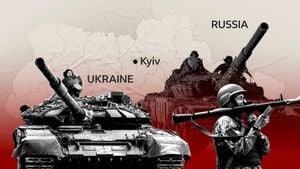Protests erupted recently across two different nations, stirring emotions and drawing the world's gaze to the unique tensions inherent within each situation. Under the shadow of mounting frustrations, demonstrators took to the streets both in Amsterdam, Netherlands, and across Cuba, as recent events unsettled the status quo.
Starting with the unrest in Amsterdam, the city witnessed disorder following violent confrontations during football matches. Pro-Palestinian protesters defied local government bans, spurred by recent clashes between Israeli football fans and rival groups. According to reports, Dutch police detained several demonstrators who gathered on Dam Square, voicing their dissent against the violent atmosphere perpetuated by such confrontations.
Earlier, the Amsterdam District Court upheld the mayor's decision to ban protests after violence erupted between supporters of Maccabi Tel Aviv and groups on scooters. Eyewitnesses reported rampant violence after the UEFA Europa League match against Ajax, which sparked international outrage. Attacks on Maccabi supporters left several individuals hospitalized, creating ripples of concern throughout the Jewish and wider communities.
The protestors emphasized their right to demonstrate, holding placards demanding justice and raising their voices for the Palestinian cause. Frank van der Linde, one activist present during the protests, highlighted the importance of contesting not just violence but also the infringement of civil liberties. "This protest has nothing to do with anti-Semitism," van der Linde asserted amid controversy surrounding the recent altercations.
Police responded to the burgeoning crowd by deploying riot gear and swiftly moving to detain those who continued the protests after the imposed ban. Reports indicate at least 63 arrests following the unrest, though some demonstrators remarked on their determination to speak out regardless of the risks posed by legal ramifications.
Meanwhile, over 7,000 kilometers away, Cuba faced its own storm—literally and figuratively. Just weeks after experiencing major power outages due to Hurricane Oscar, islanders were plunged back to darkness with the advent of Hurricane Rafael, which hit the island as a Category 3 storm. Once more, residents were left frustrated and angry, prompting significant demonstrations against the Castro-led government.
The Cuban government confirmed arrests during these protests, which were some of the most pronounced public displays of dissent lately seen on the island. Street protests are seldom witnessed under the communist regime, making the situation all the more captivating. Human rights groups reported upwards of 10 arrests surrounding the demonstrations, with charges brought against individuals for public disorder and aggression.
While officials reported restoring power to half of Havana, frustration lingered as many remained without access to electricity days after the storm's aftermath. The cumulative effect of repeated blackouts and economic instability has engendered alarm among the populace, with many understandably restless about their government's inability to manage crisis situations efficiently.
Both of these events highlight stark parallels, reflecting moments of sociopolitical turbulence across cultural landscapes. They pose enduring questions surrounding civil rights, accountability, and governance—an energy reverberated by the demonstrators themselves as they try to carve out their unique narratives amid grand historical dilemmas.
Pressing questions arise out of these scenarios: how can protests nature reflect the sentiments and frustrations drawn from the struggles locals face? What will become of those detained amid the political conundrums, and how will the governments respond to the prevailing unrest? Only time will reveal the answers to these pressing inquiries as both Amsterdam and Cuba navigate their respective crises, but for now, one thing remains clear: the voices of the people are stirring, and they demand to be heard, no matter the distance.



